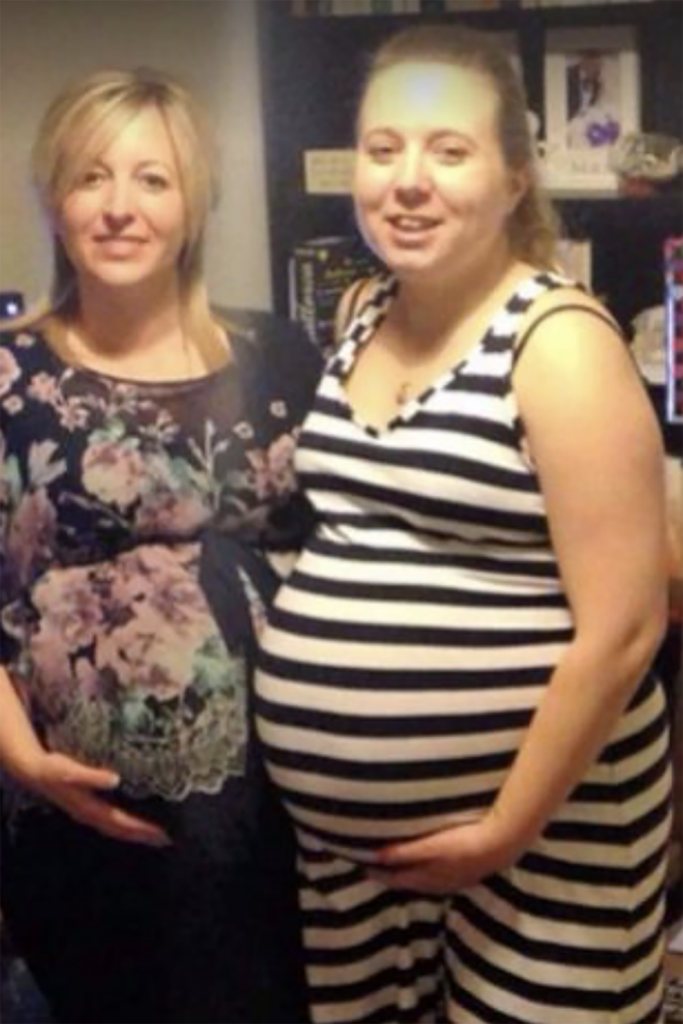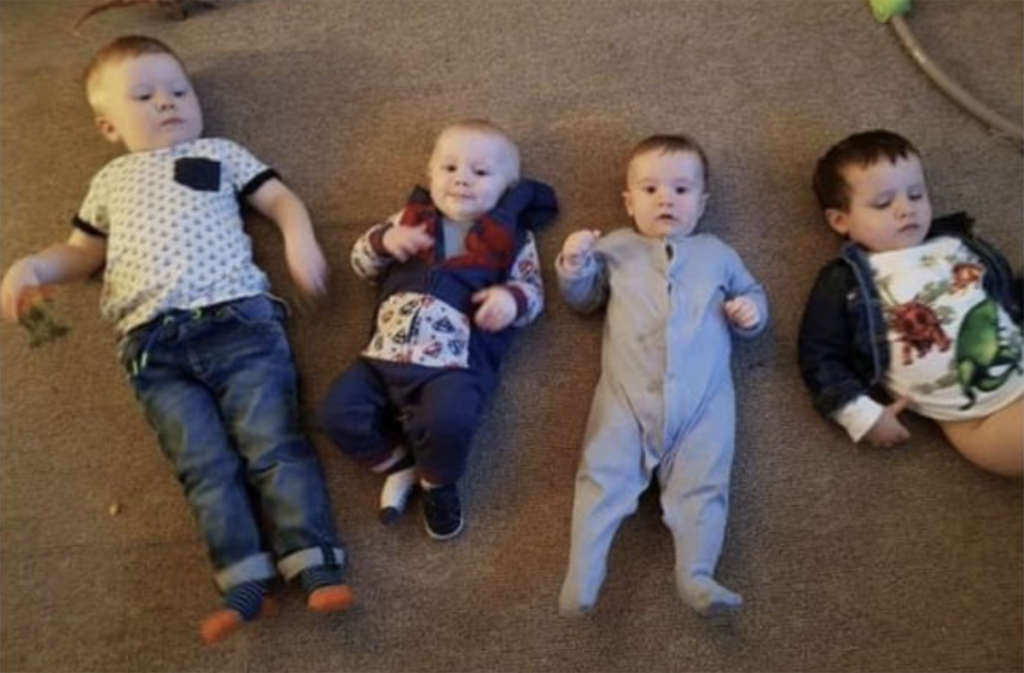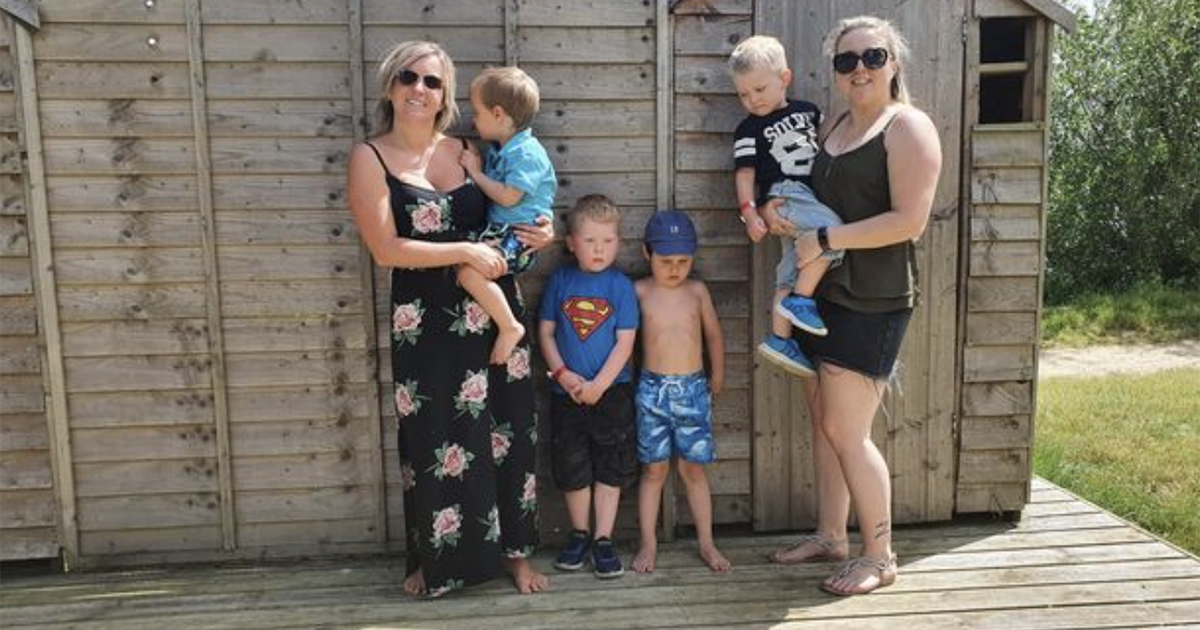The Special Bonds of Sisterhood
- The bond between two sisters from Wiltshire, England, has only grown stronger over the years after they faced cervical cancer together and gave birth to sons on the same day in the same hospital.
- Karla Oke was operated on for pre-cancer of the cervix. The situation prompted her sister, Lisa Stevenson, to get checked as well, and Lisa discovered she had the same pre-cancerous cells when she was just 19 years old.
- The sisters were each told their cervix was weak and they may not be able to carry a baby to term, but in May 2017, they each gave birth to their second sons on the same day in the same hospital.
- While it is unknown what caused Karla or Lisa’s cancer, it is known that HPV causes more than 70% of cervical cancer cases in the United States.
Karla Oke and Lisa Stevenson are six years apart; they tell The Mirror that they had a special bond growing up, but their lives playing out so similarly has only made their relationship even stronger.
Read More
Sisterly Bond
More than a decade ago, when Karla was in her early 20s, she became extremely adamant that she had cervical cancer. But, she could not get a Pap smear.
The National Health Service (NHS), England's publicly funded health care system, does not screen for cervical cancer (with a Pap smear) in women under the age of 25. The NHS cites two reasons for this, the first being that cervical cancer is very rare in women younger than 25, and it may lead to unnecessary treatment because abnormal cell changes often go "back to normal" in younger women.
Here at SurvivorNet, we always advise patients to be their own advocate when navigating the medical world; no one knows your body better than you. Karla is a perfect example of this because her instinct was right.
Advocating for Yourself While Navigating the Medical World
She received surgery for pre-cancer of the cervix. Pre-cancer is when cells in the transformation zone do not suddenly change into cancer, according to the American Cancer Society. Instead, the normal cells of the cervix first gradually develop abnormal changes that are called pre-cancerous.
Because of Karla's persistence with her own health, she in turn saved her sister Lisa's life. Karla's situation prompted Lisa to get checked as well, and Lisa discovered she had the same pre-cancerous cells as Karla when she was just 19 years old.
Doctors told Lisa that she likely would not have made it to her 25th birthday had she not insisted on getting herself checked.

In 2013, after their respective cancer scares, the sisters each began trying to get pregnant, despite doctors telling them that their cervixes were possibly too weak to carry a baby to full term.
But in February of that year, Lisa experienced her first miscarriage. About six months later in September, Karla also miscarried. They supported each other through this devastating life experience, too, as they could understand each other's pain.
But they did not let that pain stop them. They both got pregnant again, and in the summer of 2015, they had their first sons, Eli and Spencer, now 6, within a few weeks of one another.
"We thought that was going to be the end of our relationship one of us would be able to have a baby and the other wouldn't, and it would be too hard to see each other," Lisa says of their miscarriages in 2013. "But then we both fell pregnant at the same time and had our first babies three weeks apart!"
One year later, in 2016, Lisa confided in Karla that she was pregnant again, and Karla was "super happy" for her sister.
"Then one day a few months later, I drove her (Karla) to the doctors, which she told me was just to check something," Lisa says. "I watched the boys in the car and she came out and said it had been her midwife appointment." Karla was pregnant again, too.
This time, when the sisters gave birth in May 2017, it was on the same day in the same hospital.

"It's still very surreal to think we had our boys on the same day, on the same ward," Karla says. "I remember being up all night talking to Lisa via text to see how she was getting on. I was having contractions the whole time but I thought it was just Braxton hicks."
"Once I gave birth to my son," she adds, "Lisa came into my room with her baby. It was such a lovely experience to be able to hold your newborn baby and your brand new nephew at the same time. It was very special."
"Our boys (Axel and Preston) have the most amazing bond."
Understanding Cervical Cancer
Cervical cancer is a type of gynecologic cancer that is typically detected through a routine Pap smear; during this test, your doctor will collect a sample of cells from your cervix (using a small brush or spatula). The cells are then examined under a microscope for abnormalities, including cancer and changes that could indicate pre-cancer.
While it is unknown what caused Karla or Lisa’s cancer, it is known that the human papillomavirus, or HPV, causes more than 70% of cervical cancer cases.
HPV is the most common sexually transmitted infection. In fact, it is so common that nearly all sexually active men and women get the virus at some point in their lives, according to the U.S. Centers for Disease Control and Prevention. About 79 million Americans have HPV.
HPV and Cancer Risk: The Basics
"The vast majority of humans in the U.S., both men and women, will eventually get infected with human papillomavirus," Dr. Allen Ho, director of the Head and Neck Cancer Program at Cedars-Sinai Medical Center, tells SurvivorNet. "The important thing to know about HPV is that there are many different strains, and only a couple of them tend to be more cancer inducing. Probably less than 1 percent of the population who get infected happen to have the cancer-causing virus that, somehow, their immune system fails to clear."
Cervical cancer is unique in that it is usually preventable with the HPV vaccine. And that is why those eligible should get vaccinated against HPV, SurvivorNet experts say.
The vaccine is typically given to children before they are sexually active, as HPV is transmitted through sexual contact.
Why the HPV Vaccine is so Important in Preventing Cancer
"We recommend strongly that children are vaccinated against HPV to prevent cervical cancer, but also to prevent head and neck cancer," Dr. Jessica Geiger, a medical oncologist specializing in head and neck cancer at Cleveland Clinic Cancer Center, tells SurvivorNet.
"Now the key with the vaccine is that you received the vaccine before you ever reach sexual debut or have sexual encounters. So that's why these vaccines are approved for young children ages 9, 10, 11 years old, up to 26."
Contrary to some detrimental misinformation circulated online, the HPV vaccine is entirely safe. There are virtually no side effects with this vaccine, Dr. Jonathan Berek, director of the Women's Cancer Center at Stanford Medical Center, tells SurvivorNet. It is "incredibly safe," he adds.
Learn more about SurvivorNet's rigorous medical review process.


